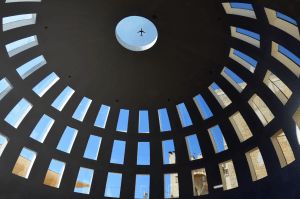We support our Publishers and Content Creators. You can view this story on their website by CLICKING HERE.
When researching the story of the Magi visiting the Christ child in Bethlehem, it is not long before one discovers the scholar’s opinion that the Magi story is likely to be a story concocted by the early Christians—and probably Matthew himself, in order to show Jesus to be the long-looked-for Messiah and fulfillment of the Old Testament prophecies.
It is argued that Matthew is writing to a Jewish audience and is everywhere keen to show Jesus as the fulfillment of the Old Testament. Matthew certainly does point out various fulfilments of prophecy. He does this specifically when he says, “So and so was done to fulfill what the prophet wrote,” and he goes on to quote the relevant Old Testament passage. So, for example in verse six of chapter two, the birth in Bethlehem is a fulfillment of Micah 5:2-4:
But you, Bethlehem Ephrathah,
though you are small among the clans[b] of Judah,
out of you will come for me
one who will be ruler over Israel,
whose origins are from of old,
from ancient times.
Similarly, Matthew sees the flight into Egypt as a fulfillment of Hosea 11:1: “Out of Egypt I called my son.”
Throughout Matthew’s gospel the echoes of the Old Testament are obvious. When he preaches the sermon on the Mount and feeds the five thousand, Jesus is portrayed as a new Moses—who gives a new law from the mountaintop and feeds the people in the wilderness.
If this is Matthew’s motive and method, is it right to conclude that he actually composed some stories to fulfill Old Testament prophecies? Luke doesn’t mention the visit of the Magi, and on face value the story seems improbable. Did Matthew search the Old Testament prophets and psalms and devise a clever story to show that the savior’s birth was even more extraordinary?
Certainly, at first glance the Old Testament passages that are traditionally seen to be prophecies of the Magi’s visit seem happily congruent with the events. Is the match up just too good to be true? Isaiah 60 is the key passage. It reads:
Arise, shine, for your light has come,
and the glory of the Lord rises upon you.See, darkness covers the earth
and thick darkness is over the peoples,
but the Lord rises upon you
and his glory appears over you.Nations will come to your light,
and kings to the brightness of your dawn.Lift up your eyes and look about you:
All assemble and come to you;
your sons come from afar,
and your daughters are carried on the hip.Then you will look and be radiant,
your heart will throb and swell with joy;
the wealth on the seas will be brought to you,
to you the riches of the nations will come.Herds of camels will cover your land,
young camels of Midian and Ephah.
And all from Sheba will come,
bearing gold and incense
and proclaiming the praise of the Lord.All Kedar’s flocks will be gathered to you,
the rams of Nebaioth will serve you;
they will be accepted as offerings on my altar,
and I will adorn my glorious temple.
It all seems to be there: the kings, the camels, the journey from a distant land and the magnificent gifts.
The other passage is psalm 72:
May the kings of Tarshish and of distant shores
bring tribute to him.
May the kings of Sheba and Seba
present him gifts.11
May all kings bow down to him
and all nations serve him.Long may he live!
May gold from Sheba be given him.
May people ever pray for him
and bless him all day long.
Once again we have the visit of foreign kings bringing gold to pay homage to the King of the Jews.
It is from the three gifts and these passages that the tradition developed that the magi were “three kings.” Matthew never gives the number of visitors nor does he mention kings. For that matter, he also doesn’t mention camels and dromedaries, but he does mention the gift of myrrh.
If Matthew was trying to craft a story that fulfilled the prophecies he didn’t do a very good job! He should have woven in the camels and the kings, and for that matter why didn’t he mention the Bethlehem shepherds? It would have provided a nice “thus it was written by the prophet Isaiah” when he spoke of “Kedar’s flocks being gathered to you” and “the rams of Nebaioth will be accepted as offerings.”
His mention of the myrrh also betrays him. Isaiah talks about gold and frankincense, but there is no mention of myrrh. If Matthew was devising a fulfilled prophecy story he should have omitted the myrrh.
It is much more likely that the visit of the Magi happened pretty much as Matthew recounts. If it were a fabricated story Matthew would have done a better job of weaving in the relevant details. The fact that he does not say, “Thus it took place to fulfill what the prophet Isaiah wrote” is evidence for the historicity of the account, and it is even possible that Matthew missed the connection to Isaiah 60 and Psalm 72 entirely.
Some of his other Old Testament links are rather tenuous, so one wonders why he didn’t make the Isaiah 60 and Psalm 72 connections and tidy up the details to make the story fit better.
All this contributes to the conclusion that the Biblical scholars who opine that Matthew was being overly creative are themselves being overly creative. It is much better to conclude that the visit of the magi (however unusual) really took place, and my own theory that the magi were astrologer priests—counselors to the Nabatean King Aretas IV and emissaries to Herod the Great—is the best solution as to their historical identity.
Fr. Dwight Longenecker is the author of The Mystery of the Magi: The Quest to Identify the Three Wise Men.
The Imaginative Conservative applies the principle of appreciation to the discussion of culture and politics—we approach dialogue with magnanimity rather than with mere civility. Will you help us remain a refreshing oasis in the increasingly contentious arena of modern discourse? Please consider donating now.
The featured image is “The Adoration of the Magi” (1526) by Quinten Metsys. This file was donated to Wikimedia Commons as part of a project by the Metropolitan Museum of Art and is made available under the Creative Commons CC0 1.0 Universal Public Domain Dedication courtesy of Wikimedia Commons.
Share This Story, Choose Your Platform!
Go to Top

 Conservative
Conservative  Search
Search Trending
Trending Current News
Current News 






